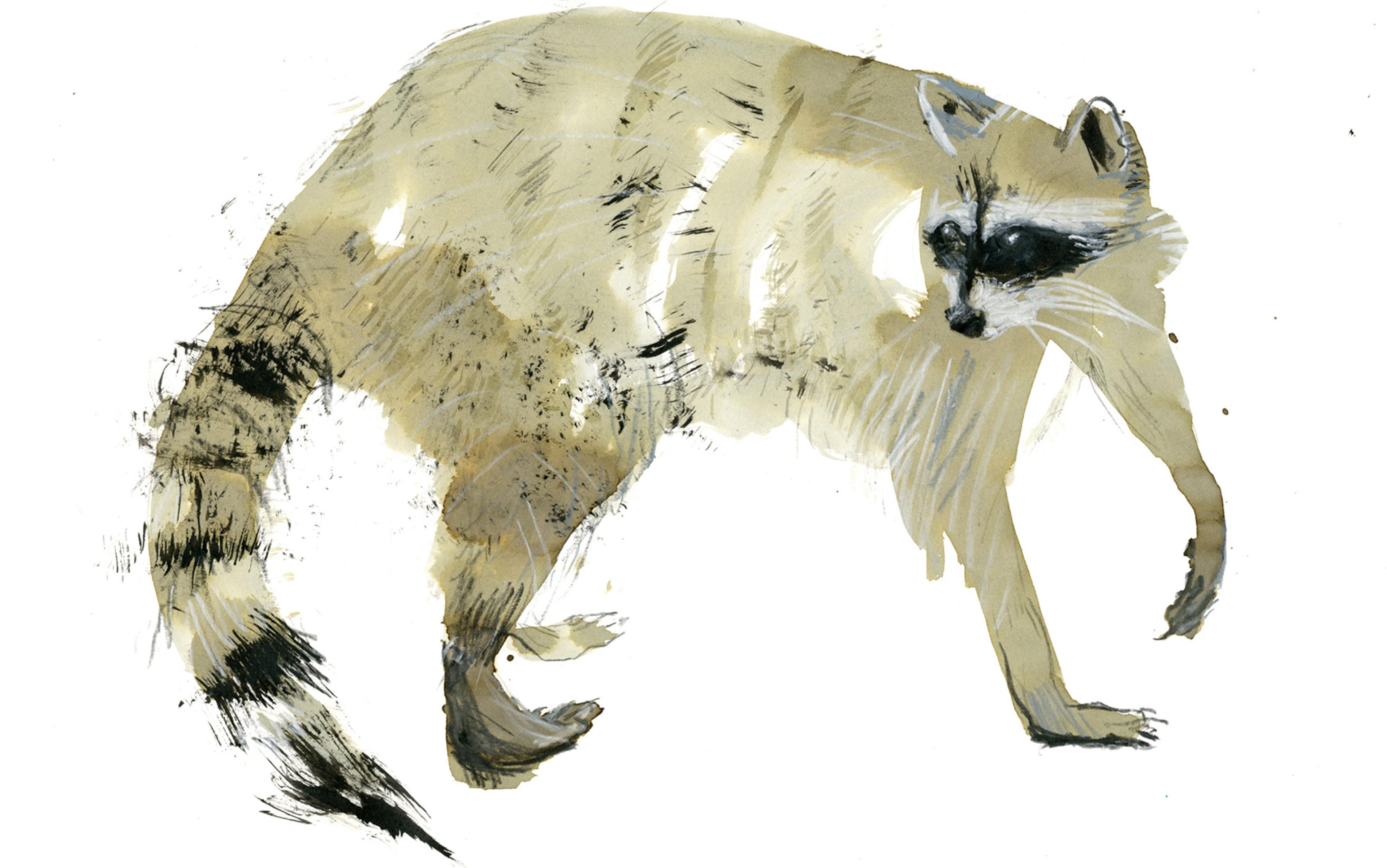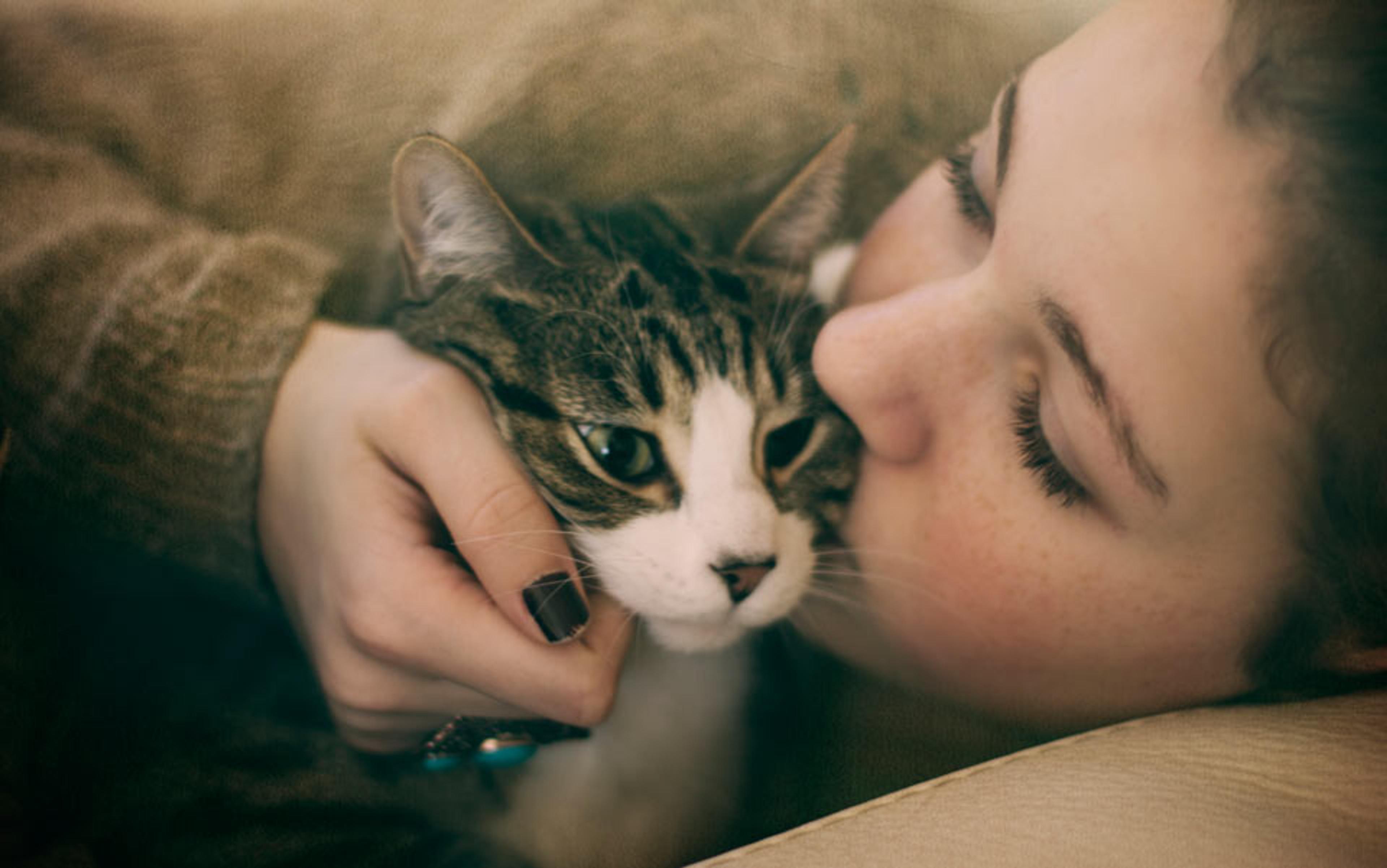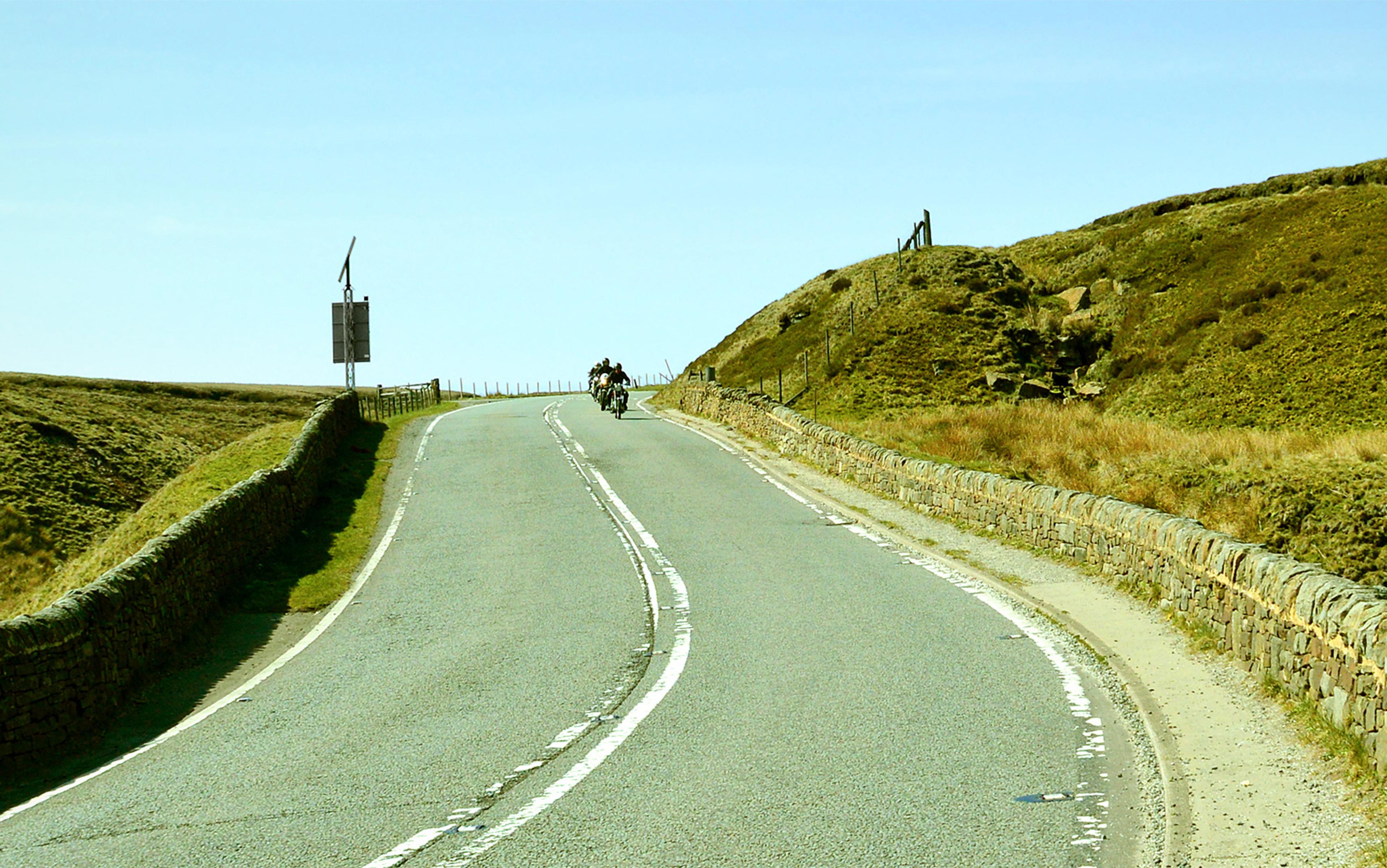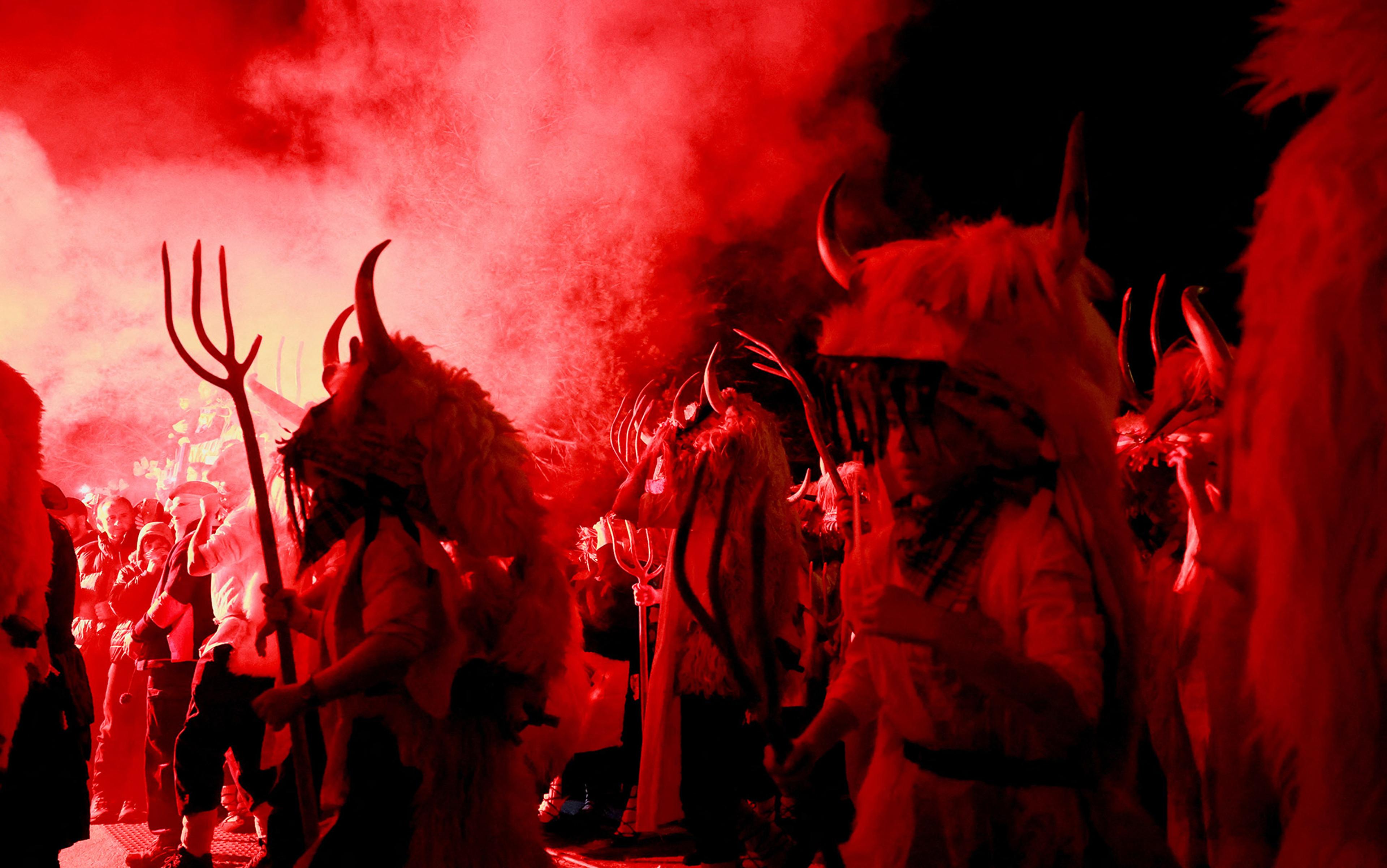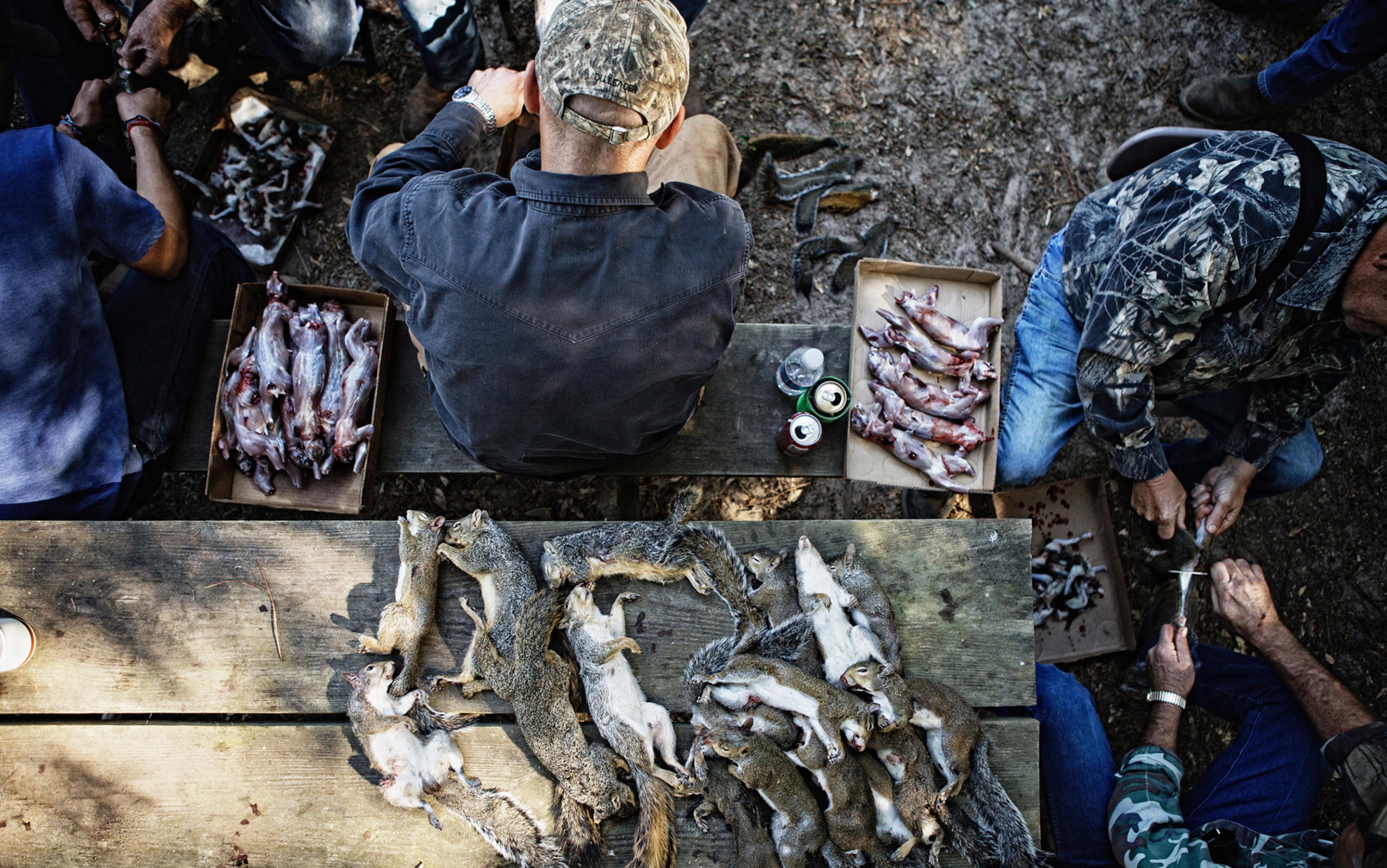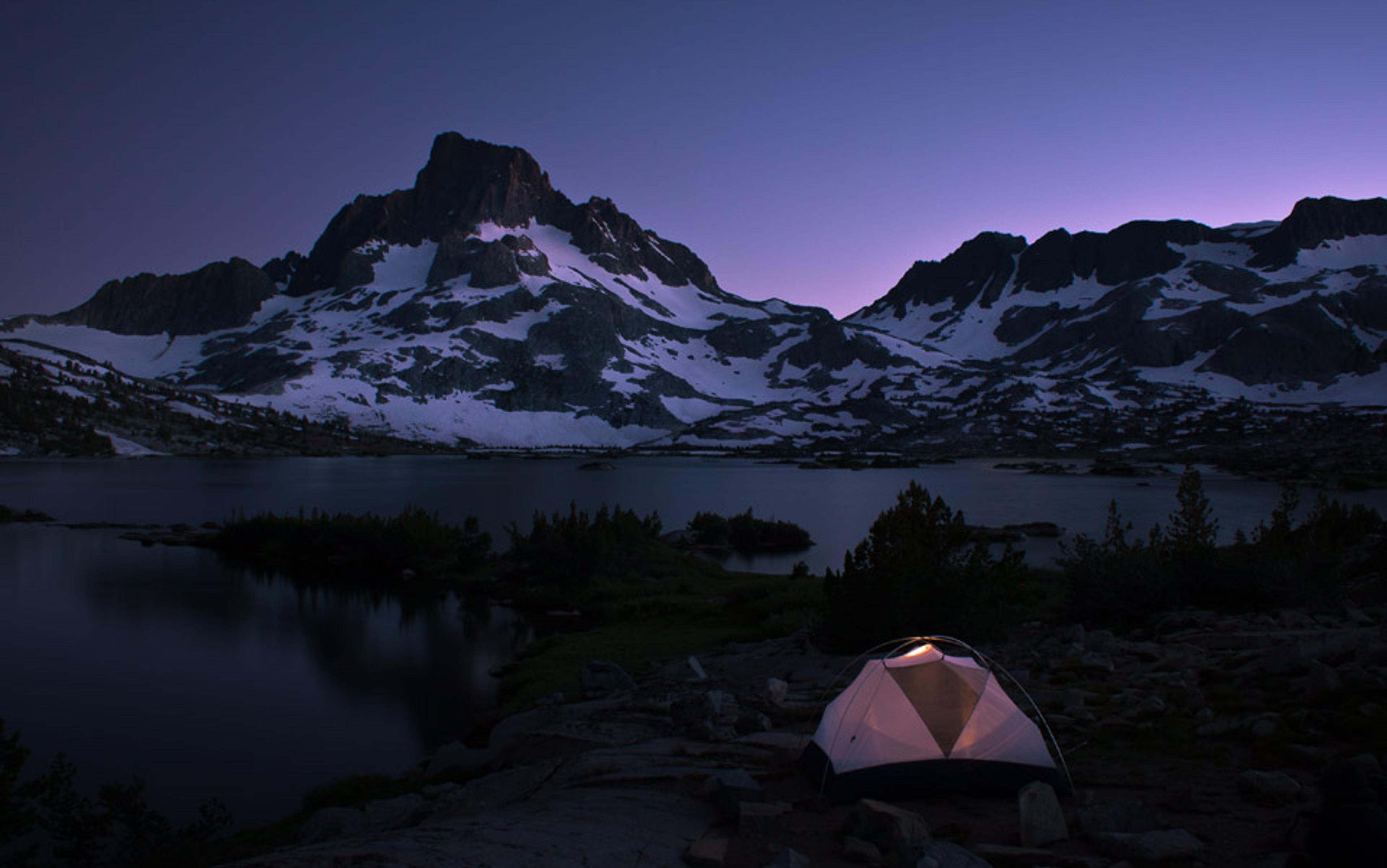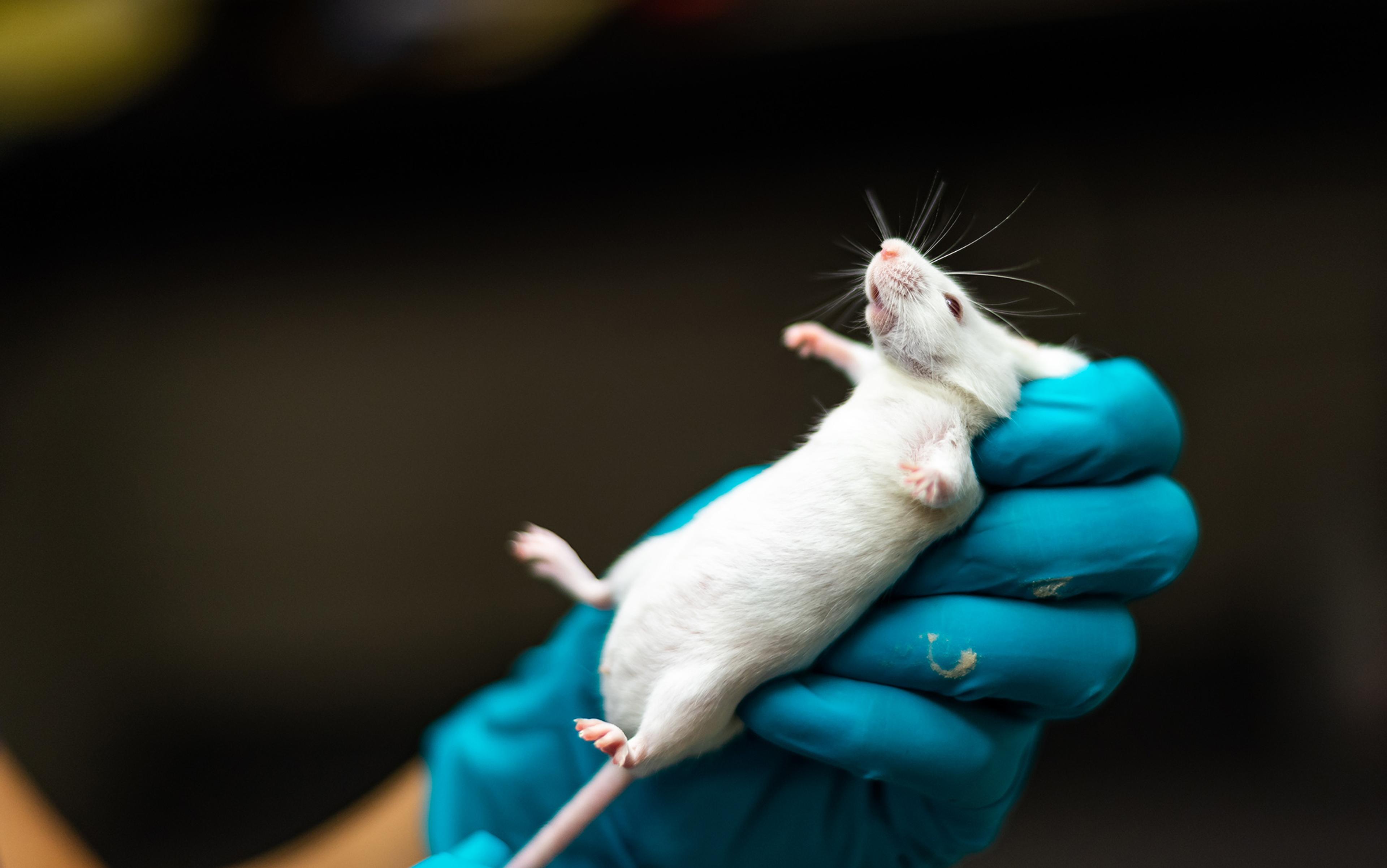They might as well have been from the Isle of Skye. Or Australia, the Antarctic, what have you. Her hair was long and blonde, her skin so pale I could see the blue throb of a vein in the nook of her neck. Behind her hung a child, with two long braids expertly woven, tied off at the ends with red ribbons. The child lingered at her mother’s legs. The summer sun glared on the stoop where I stood. I tried to peer behind the little girl, but the house was dark, the only light glinting off a gun hung on the wall.
It was high summer, midafternoon, the cicadas creaking and my vinyl suitcase absorbing sun like a sponge so when I lifted the handle to step inside the plastic seared my skin. I dropped the suitcase. From behind me my father — go now — his hand at the small of my back. The woman motioned me in. Go now, he said again.
And so I went.
The house was already crammed with children, none of them strays, like me, but several of them with questionable connections to one another: steps and halves, which made me think of a girl sliced down her center, half her mouth missing. I was neither step nor half but foster, sent from the state. Is that why I got the smallest room, under the eave at the end of the house, a room so small that if I spun in its center my outstretched hands brushed the walls, which themselves were busted and bulging with all manner of mysterious cracks? Built in 1774, the old arthritic house groaned and sighed at night. I’d lie there in my little bed and sometimes it seemed I was spinning so fast I’d have to steady myself on the warbling walls. Other times those walls seemed to speak to me, to beckon me, and I’d spend hours past midnight peeling off paper to see what lay beneath. I remember finding grapevines whose twisted paths I could trace with my finger, up and down and around, over and over again, a rhythmic, almost melodic movement of mind and body that reminded me of riding and eventually sent me to sleep. In the first summer month of my stay with that family, my dreams seemed always sparse, my slumber all static. I’d wake most mornings parched, a bedside fan churning the boggy air, their tap water tasting tinny as I drained it down.
I became the Trevors’ foster child in August, 1978. That was the summer of heat waves, the lawns turning taupe, the garden beds all brown. Wherever you looked you saw a hot, whitened world. Air conditioners rattled in windows up and down the street, but in the Trevors’ house it was quiet and close, the circuitry too old to support so much wattage, the windows all open and the white curtains flapping like flags in the thick air.
Afternoons, in this high heat, the Trevors reclined on lounge chairs under their grape arbor, bottles of wine in a bucket of ice, long-stemmed glasses on a table before them. I watched Cranston, my foster father, lift a corked bottle by its dripping neck and with exaggerated elegance — du vino pour la femme and les petites? — pop the top and pour the liquid for Annie and himself, and then in smaller amounts for all the children, encouraging us to savor before swallowing. ‘Go ahead,’ Cranston said to me when he saw me hesitate, and so I did, if only to obey. I plucked a giant goblet by its skinny stem. ‘Now take a sip,’ Cranston said. A small sip, a sharp tang. With a second sip, my skin seemed to shed its outer layers so now I could feel beneath the heat the barest breezes. After my third sip, Annie removed the glass from me and said, ‘Enough is enough.’
I missed my mother, yes. But I missed more her atmosphere, all arrows and opera, with a little bit of blood here and there
Perhaps the wine was their secret, for Annie and Cranston shrugged off the heat, their skin fresh and dry even as the thermometer inched into the 90s, the humidity turning the air to jam. At sundown the family would steam mussels on the porch, prying them open and sucking the innards down, tossing the hitched shells into the bushes. Where I was from we didn’t eat shellfish — it wasn’t kosher — so when Cranston offered me a mussel, I had to say no. Still, I watched them closely. I saw the opened shells, the oily glimmer of the packed fish inside. I saw how they tipped back their heads and, using the shell like a spoon, sucked down the steamed meat, a little trigger bobbing in their throats when they swallowed.
I don’t think there’s a reason for everything, but if I did I might say God — and not the state — matched me with the Trevors because they were everything I was not. I was Jewish. The Trevors, blue-blooded Brahmins. I’d grown up celebrating Shabbat on Friday evenings, lighting candles and singing the Schma. The Trevors knew nothing about Friday nights, instead serving their Sabbath on Sunday, at the odd hour of 3pm. By evening you were done with the whole thing and had nothing to do but watch the red disc of that summer sun flare behind the trees.
Alone in my room, I thought about this clan, their wine, their Sunday pork, the way they loved to lounge beneath the leafy shade of their own vines. I thought about how their antique house stood out on a street of small square boxes and tidy lawns, the gardens all preplanned except for theirs, packed with run-away perennials and spires higher than my head. At night the entire family read together, two parents, six kids — counting me — everyone sitting around the dinner table with a book, no noise except for the turning of a page. I’d bring a book down along with everyone else. But my words seemed always senseless, scrambled, and I had the feeling I was up above, attached to no one or nothing, circling a place without pain, this home so singular and basically serene. I couldn’t see how to settle.
In my mother’s house I learned to live with a heightened awareness that put my every sensory organ on alert. I listened to the sound of footfalls coming closer, now going away; lying awake at night, I heard her making her way down the hall, a shadow gliding over my sheet. I was nourished on danger, and rage too, a heady brew that brings the world to its brilliant boiling point for hours of every day; and you come to need it that way. You lose the casual manner of living, tasting a little of this, a little of that, the music on low, the page turning slowly, some sustaining story emerging. I knew nothing of this sort of sanity, thus I could not adjust to the Trevors’ territory — wacky, happy, harmless. It left me empty and disoriented, longing for my long-lost poison. I missed my mother, yes. But I missed more her atmosphere, all arrows and opera, with a little bit of blood here and there.
My father had always claimed that my mother changed once her babies were born, that before her pregnancies she’d been carefree, and I have a picture that suggests he was correct. In it my mother is young, not much more than 20, and she wears a paisley kerchief tied beneath her chin, some stray curls blowing in a swift sea breeze as behind her a massive ocean moves. Her mouth a festive red, she purses her painted lips in a coy kiss-me pose as somewhere in time the camera clicks and captures this second self. Once the babies came, my father always explained, so too did her rages, growing right along with me, her once playful smile crimped into a curve beneath which stewed a sadness for something I could never salve. Social services got involved a few summers after horse camp, when, without distraction or passion, forbidden by my mother to continue the only out I knew — riding — I began to cut myself.
Still, I missed her. It was she I thought of as I explored the Trevors’ old home, opening their medicine cabinets, palming their pills, unscrewing the tops of mysterious glass bottles with alien scents inside. I tried on Annie and Cranston’s reading glasses, hooking the rims behind my ears, my held-up hand suddenly huge and pink and misty, not mine. What was?
Houses never rest; I knew that, but the Trevors’ house was especially full of chatter. I could hear the mice, the mosquitoes, the cats crying, and then sometimes from within the walls the sound of large mammals making their way; I heard as they tumbled above me, their play so raucous that bits of my ceiling sifted down, and I heard as they walked right by my bed, nothing between us but cracked plaster, paint, and paper. ‘Raccoons,’ Annie said when I asked her. ‘They live in the walls here.’
Every night they came, walking in the wall beside my bed. I started to scratch at that space, trying to widen a tiny puncture already present. I found an X-acto knife and, after checking to see that my door was closed, I used its precise point to trace a small porthole. Flexing my first finger, I gave the wall a push, surprised at how cleanly it all gave way, leaving a quarter-sized hole, perfect for peering.
I turned out my light. I peered in. From far down the wall I heard the lumbering of a single coon. He came closer and closer still, and then I could smell him, pungent and moist, and then I could hear him chuffing as he ambled even closer, my heart picking up, and suddenly, for the first time, I felt like I lived here, like I was pinned to this place that was silent with sleep except for me, still staring as his smell grew stronger. And then, quite suddenly it seemed, he came around some corner and I was eye to eye with a beast.
The eye had a wet shine, with a dark ink drop of a pupil. The pupil seemed suspended in liquid. ‘How goes it?’ I asked, and then the animal suddenly vanished and I found myself staring at space. Every night now I waited at my porthole for communion with the coon. And every night the animal and I did nothing but simply stare at one another. It seemed to fulfill some need for both of us and then, abruptly, it was over. I would look away, look back, and the beast would be gone, or he’d blink several times in rapid succession before rambling off.
Leaning beside the wall I began to sculpt the hole larger, cutting crescents out of it until, one night, a pointed nose emerged from my aperture, leathery but wet, two dark dots for nostrils and then a tiny tongue. Slowly, I offered my upturned palm and the snout pushed further out, eagerly taking in my myriad scents, so many it seemed I had, because the snout just went on sniffing, salt and sand and who knows what else lay in the layers of me. This went on for I’m not sure how long, because when I woke up the coon was gone and I’d apparently slept slumped against the wall.
And so it was that night by night I made the hole larger and night by night the coon presented more of himself to me. I’d say the coon had maybe come a quarter of the way out of the wall when Annie discovered my project. Cleaning, she found the busted plaster and when she looked closer she saw the treat tidbits I’d started to use, aligned along the wooden beam running just inside the wall. That night she and Cranston took me aside and with my bedroom door closed asked me what I was doing. Because I had no fib I simply told them the truth, wondering if for this sort of behavior unrelated children were tossed out. I told them the whole story, how I was courting a coon, my many midnight visits.
When I was finished — a long silence. I could hear my heart. It was hammering high up. Cranston walked across the floor, knelt by the bed, and examined my punched-out place. Annie stood, looking serious.
At last Cranston spoke. His back was to me as he fingered the rim of the hole. ‘Boy or girl?’ he asked.
‘What?’ I said.
‘Your midnight meetings,’ he said. ‘Is the raccoon a boy or a girl?’
‘Boy,’ I said, suddenly sure.
‘Why do you think that?’ Annie asked, and I thought I saw the small flicker of a smile.
‘It’s how he smells,’ I said, and then suddenly they were laughing.
‘Kids,’ Cranston called, opening my bedroom door. ‘Kids! Come look at the coon hole Lauren has made.’
All the kids came and I described for everyone going eye to eye with the beast, and even the boys were impressed. ‘I’ll tell you what,’ Cranston said, looking at me.
‘What?’ I said.
‘Let’s make this hole a little larger and tonight we’ll pull him all the way out and make him ours.’
Because coons are nocturnal, we needed darkness. Come midnight, and with the lights off, we all crowded around the cutout by my bed. Cranston handed me bait, bits of bacon and blue cheese. I lay it all carefully on the ledge and then we sat back to wait. Outside clouds scudded across a polished sky, wind teased the trees, but inside, we heard not a single stirring. It was as though all the animals that lived here caught wind of what we were up to and fled; the mice followed by the coons followed by the bats, beetles and ants.
At last Cranston, sitting in a chair by my desk, rose without a word, left the room, and came back with a broom that he held high and swished against my ceiling shouting, ‘Wake up critters. It’s meal time.’
Nothing.
‘Let’s sing,’ suggested Annie.
‘I’m not singing,’ said one of the boys.
‘I’d sing,’ I said, because at home we sang the blessing over the bread and wine on Friday nights; we sang together, and even though god never answered, the singing itself seemed something.
‘Michael, row your boat ashore,’ Annie began, and I joined in. Cranston sighed, put down the broom, and Emma, the youngest, started up, and pretty soon, drunk on the darkness and general silliness of the situation, we were all yodeling away, so intent that for a few moments we forgot all about our coon, so it shocked me when I turned around to see a dark darting snout and two petite paws gripping the edge of the aperture. Cranston coasted across the room and grabbed the coon by its scruff, pulling a shockingly small body into the air. The song stopped, all of us frozen while the coon swayed and then started to scream.
I’d always thought that screaming, like crying, was a uniquely hominoid form of distress. But with its mouth open, the animal screamed and screamed, its sound eerily familiar as it struggled under Cranston’s grip. Tears sprang to my eyes. I hadn’t meant them to but there they were, and Cranston said, ‘Shush, little baby,’ and curled the animal into the crook of his arm. It was so much smaller than I’d expected, clearly an infant and barely even that. Cranston rocked it and the coon quieted. ‘I’d say,’ he announced, ferreting in the fur below its stomach, ‘I’d say our catch is a girl.’
For a second all was silent while we took in the news. I looked back at the hole by my bed and it seemed for the first time downright menacing, pouring dust and darkness. Finally Cranston walked over, knelt by my side and, as carefully as he could, transferred the now-slumbering mammal into my arms. ‘She’s all yours,’ he said. ‘She’s in a brand new home. Now help her find her way.’
That night the raccoon stayed in a large cage in my room. She made strange noises — chirps and chatters, squeals and yips, calls, perhaps, to her cohorts on the other side of the wall, and indeed I heard what seemed like answers, strange scratches, long yodels, nervous pacings back and forth. At dawn the family would awaken and crowd around, wondering what the raccoon could do. I wanted to be the first to see and so, quietly, I freed the latch on the cage. After crawling out, however, the animal refused to move. She stood in the center of my room, hunched on her hind legs, her front paws dangling down, kangaroo style, looking left and right as if assessing her surroundings, all traces of her terror gone, replaced with, it seemed to me, a systematic sort of study she carried out with staring — at the walls, the floor beneath her feet, the spackled ceiling. It amazed me how fast grief could go, how quickly, in certain sorts of beings anyway, curiosity took the place of terror.
Before too long my eyes began changing, my vision, trained for terror, for trauma, now narrowed in on plain everyday objects and experiences previously hidden from me
I instantly admired that raccoon, even if I anthropomorphised her, and I’m sure I did, but not to the point that I failed to note her differences. I admired how she could go from being completely at sea to securely anchored in what just happened to be this noun called me. Of course, I could not have said so with such certainty at the time, when I was too young to know my metaphors. What I did know, however, was how new this old house was, for her and for me, and whereas I’d wept for weeks, she had for no more than a moment. I began to move, and she began to follow me with what seemed like total faith, scampering after me as I made my way down the stairs, at my heels as I traveled towards the kitchen. I circled the dining room table 10 times, and 10 times she went with me. It was as though the raccoon were hitched to me by some slender string.
We called her Amelia Earhart, Amelia for short, although I cannot recall the reason for the name. What I can recall is how much she changed my stay with that family, how impressed I was by her seemingly immediate adaptation, how she attached to me so easily and then found the fridge, learning to open it with her agile paws, pulling out bunches of dark grapes and blocks of wrapped cheese. Unlike me, Amelia would eat anything and, taking my cues from her, I began to do the same, one warm night mixing my meat with my milk, another night sucking the mussel straight from its peeling shell.
Amelia was always on the move that hot summer, couldn’t be caged, rarely seemed to sleep, her sounds making their way into my dreaming, my night-mind now full of impossible animals: humans with tails, fish with feet. Occasionally I’d startle awake to find her hunched at the end of my bed, looking straight at me, something so insistent in her gaze one could almost think she was trying to pass me a message. Sometimes, unable to fall back asleep, I’d toss aside my sheet and, with Amelia next to me, I learned my new nocturnal neighborhood, the houses doused in darkness as we walked here and there, setting our stamp in soil, leaving behind us a trail of where we had been. Even today, 30-some years later, I recall the names of those streets I found with Amelia, perhaps because of Amelia: Oakvale Road, where the Carneys lived, and Dale Way, where almost every house had an above-ground swimming pool hidden by high fencing.
When we explored those streets by day, everyone came running from their houses, old women with curlers in their hair, mothers with mixing bowls. ‘What animal is that?’ they all wanted to know. People like to watch the wild, but we like it even more when nature and culture collide. There I was, a fully formed human, my tongue trained for language, my hands for napkins and knives. And there Amelia was, at my heels or perched upon my shoulder, an animal pulled from a parallel universe, living proof that two separate spheres could happily intersect. Except for the immediate neighbors, no one knew where I came from and no one cared to ask; so the final point perhaps was this: I went from being an invisible person to ‘The Girl with the Raccoon.’ By midsummer it seemed everyone in my new town had heard of me.
Before too long my actual eyes began changing, my vision, trained for terror, for trauma, for large sweeping scales, now narrowed in on plain everyday objects and experiences previously hidden from me. Peach pits at the bottom of the fruit trees. Dust furred on the rim of a cup. The pleasures of picnicking, which Amelia introduced me to, down by a pond stocked with carp. Annie provided the basket, but I’d insist on packing it, slowly sifting through their cupboards, holding up the glass woman full of salt and the glass man full of pepper, sniffing the cinnamon stored in a perforated tin. In my mother’s home we weren’t allowed to loll about in the pantry, so this too was new for me, and strangely delightful, canned cherries floating in fluid — May I have one? Help yourself — Annie watching as I, raccoon-like, fished about with my fingers, pulling two up by their black stems, and popping them in my mouth. The fridge yielded up bibbed lettuce, tomatoes on the vine, wedges of chocolate cake, wheels of cheese coated in a thick white wax. Piece by piece I’d decide what to bring, then we’d walk off into the woods, laying a towel down by the pond, Amelia immediately crouching at its edge, ready to fish for her supper.
Although the pond was stocked she always waited a good long time, looking, I assumed, for the perfect catch, while I lay there watching the sun cross the sky. Something uncoiled in me in those woods with Amelia, something long held hard and tight, a plaque of protection; I lay it down for a while and learned what life was like lived at a slower, lower level. I still missed that high-stakes, home-grown fright; I’d be lying to say otherwise. But by poking a hole in the Trevors’ wall, it seemed I’d opened up a separate space inside of me as well, a space I could sense, and almost see, like a cupboard waiting within me, and inside that cupboard? A cane. A comb. A stone. Sometimes I’d open the cupboard door to find an old woman sewing; other times I’d see grass that went back and back and dim in the distance a piebald pony grazing. I never knew what I’d find in there, or why; only now, years later, do I see that what united these objects was their quotidian character, the plain and quiet kind of plenty you miss when walking on a wire.
When Amelia came to us she was wild, but within 24 hours it seemed to me she’d consented to tameness. I had no way of knowing that this was untrue. I didn’t understand that when Amelia followed me everywhere she acted out of instinct, not fondness. Later I read the work of the ethologist Konrad Lorenz, who made famous the fact that orphaned wild ducklings would cathect to the first person they saw after struggling free from their shells, that person’s face indelibly imprinted on the infant animal’s malleable brain. I’d see in Lorenz’s book photos of him walking like the Pied Piper, a long line of geese waddling behind him. Lorenz also discovered that if, upon birth, the wild geese first saw a boot, or a spoon, in motion, they would imprint upon it with the same ferocious loyalty, longing only to be near the inanimate object, somehow sucking from it succor and safety without thought or plan.
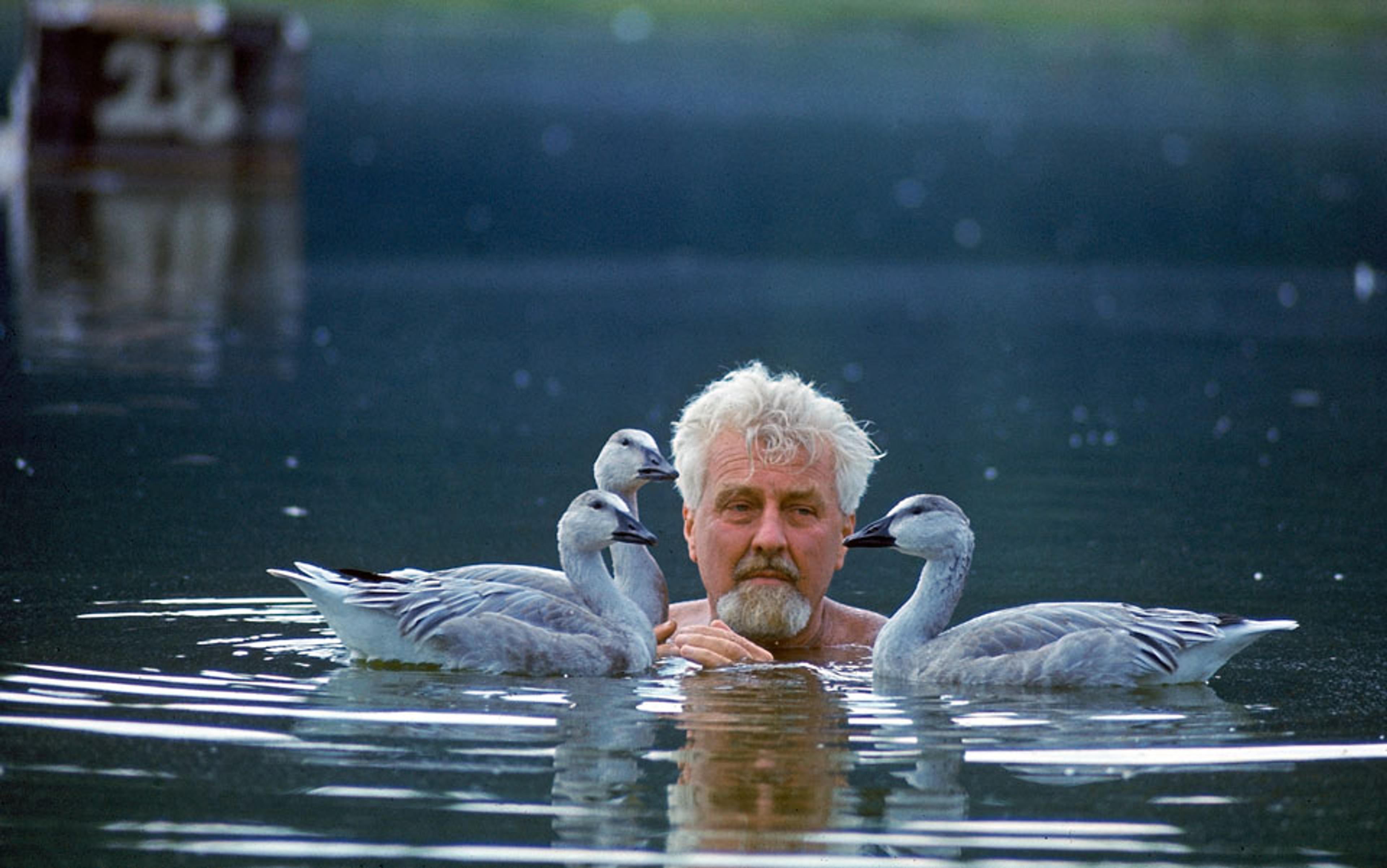
Austrian scientist Konrad Lorenz swims with a trio of Graylag geese, Bavaria, Germany, 1964. Photo by Nina Leen/Time Life Pictures/Getty
Amelia, in other words, was not following me because she loved me; she followed me because some dumb drive urged her to do so, the drive itself as wild as wings or water. Does this diminish the encounter? Not at all. We adore our pets not because they love us, but because they prove to us, day after day after day, that we love them with a purity not possible in human-to-human encounters. Our animals prove to us how capacious the human heart can be, and in doing so they give us a great gift.
Amelia, not a human, not by a long shot, began to grow, and with wild alacrity. Her baby teeth disappeared, sliding from their slots, and in their place came fangs. Her claws, previously clear, grew cloudy and dark, and so sharp she left pits in the pine of the Trevors’ floors when she walked over them. Her fur changed too, not in colour but in hue, the bristles tipped with gold and blue. Yes, Amelia grew until all of a sudden, it seemed, she was too wide to perch on my shoulder.
One morning, thinking she was done eating, I stroked her head and she sunk her teeth into my wrist. Annie and Cranston took me aside. ‘It’s over,’ they said
Soon after, her behaviors became odd and unpredictable. She would snarl at something I could not see. She started to tear apart our trash, clawing open the big bellies of bags, raiding the compost, dragging dead things over the stoop, once a rabbit no bigger than my fist, its ears ripped. Neighbors began complaining. I tried to keep Amelia in at night but she paced the house up and down, stopping to stare longingly out the window and then clawing at glass, her cries so high and hard that eventually I’d let her go. Deep in the middle of the night we sometimes heard the fights, shrieks, snarls and shatters. Every morning, the streets were strewn with trash and neighbors started leaving us protest notes.
‘Soon,’ said Cranston, ‘she’ll be too big to handle.’
I went on a mission then. I needed to prove that it was possible to make a wild animal safe. I pedaled to the local library where I found half a shelf dedicated to the topic of taming and training beasts. In 1895, I read, Sir Walter Rothschild, a British nobleman, had had a fleet of zebras shipped to him from Africa. Convinced he could tame them, he built a beautiful state-of-the-art barn and then hitched several of the equines to an impressive carriage whereupon he was taken for a ride through the cobblestoned streets of London. Rothschild worked with his zebras day in and day out, surviving, I’m sure, grievous bites and backside bruises. Although he eventually convinced them to haul some heavy loads, all in all the breed resisted his efforts, too severely stubborn for the whip or the bit. The dog was the first domesticated animal, and the hamster probably the last, but in between, people, since the earliest civilizations, have been trying to domesticate dozens and dozens of animals: the cheetah, the kangaroo, the brown bear, the hyena.
As Jared Diamond tells us, of all 148 large mammalian species who inhabit this earth, only 14 — sheep, goat, cow, pig, horse, Arabian camel, Bactrian camel, llama, donkey, reindeer, water buffalo, yak, Bali cattle, and mithan — have proven amenable to domestication or the taming that precedes it. Zebras have that nasty temper. Elephants, those gentle giants, mature too slowly, while deer and antelope panic in a pen. In general, only a handful of mammals are really fit for the farm or the human household. I was just 15 when I imbibed this sobering information — old enough to understand it but young enough to decide to discard it.
Although I couldn’t see it then, unlike the zebra and the cheetah, I ached to be domesticated, tied and tethered to a single spot. Yet being neither a child by blood nor adopted by law, I would eventually be released by the Trevors, and that fact seasoned my stay with anger and appreciation both.
One afternoon in the fading light of a December day, when all the trees in town were strung with tiny teardrop lights, I found on the kitchen counter a check from the state — the monthly payment for keeping me. I studied it a long while, turning it over and over in my hands, and then, before I could stop myself, I crumpled it up and threw it in the basket by Annie’s desk. ‘Did you do this?’ Annie later asked me, holding up the creased check.
‘No,’ I said, too quickly. And then added, leaning closer, ‘What is it?’
‘Nothing,’ Annie said, pulling the paper away and folding it in half. She slipped the check into her pants pocket and walked upstairs.
Raccoons normally hibernate, but that winter Amelia had no need. We were still her steady food source, and every morning, even in the thickest of snows, she’d show up on our stoop, covered with cobwebs, waiting for her milk and table scraps, which she’d eat and then settle down to sleep before the hearth until late afternoon, when she wakened in an always playful mood. She loved to bat around balls, climb curtains, taunt the dog, and bathe in the bathtub, her fur when wet showing its oily sheen. Her antics endeared her to anyone and everyone and must have had something to do with why Annie and Cranston, despite their stated misgivings, continued to allow her in, day after day, despite the threat of injuries large and small. One December morning, thinking she was done eating, I accidentally stroked her head and she sunk her teeth into my wrist. Annie wrapped the wound up tight muttering ‘Jesus’ under her breath. That night, Annie and Cranston took me aside. ‘It’s over,’ they said.
I wept tears that collected in the corners of my mouth. I wondered if Amelia would starve without us, if somehow, by taking her into the human realm, we’d torn or tainted the basic instincts she’d need to survive in the wild. It turns out the answer is yes, although back then, I’d no way of knowing. But the fact is that when we take the wild out of the wild we often corrupt the animal’s ability to navigate its natural habitat. Had I known that then, would I have acted otherwise? I can’t say for sure. I felt the lure that must be as ancient as it is intense, the drive to shed your skin; the need to know the utter other in whose eyes we see what we once were, and are still, in corners culture forbids us to investigate.
In my mind, when Amelia finally left us — which she did one day, ambling off never to return — my stay with the Trevors was over. But in fact I lived with them for three more years, going from sophomore to junior to finally senior, applying to college, getting accepted, and during this time losing contact completely with my family of origin, my mother claiming I was wild, and I often wondered if it was true, if I carried some criminal smell, some snarl that rendered me permanently unfit for human culture. The Trevors assured me I was fine, but I’ve never known for sure. There are facts, there are feelings, and then there is memory; and in my memory Amelia went out like an ember and went back to the wild, and the next thing I knew I grew and grew and grew.
The Egyptians tried and tried to change gazelles but they could not. Amelia, on the other hand, proved that a leopard could change his spots. She’d demonstrated that an animal, if only for some time, could adapt to strange situations with alacritous finesse. Where, then, did that leave me? Precisely where I was, it turns out, standing in a room, under a roof, with two people who would never be my parents, no matter what my histrionics. This was not my house. If Linnaeus came back to life and decided to categorise human groups down to their smallest boxes, I would not be placed here, and that, my dear, was that.
But because humans have two hands, there is always another hand, and on this other hand were other incontrovertible facts: that wolves will adopt baby dogs and suckle them as if they were their own. That all across the animal kingdom this cross-pollination occurs, pigs taking in lambs, goats nurturing geese; it happens. In the Bible, the guest is an honored being, a foreigner with whom you break bread. We all knew that I was a guest who had, for a period of time, been something like their little lamb, minus the wool and sweetness. Come fall, I packed my bags and left for the university. I was 18 then, so the state cut me loose. It was probably all for the best. Once my official tenure with the Trevors ended, and with it all of our obvious assigned roles, we weren’t sure who we were to one another anymore, or how we might proceed.
I went off to college in September and when I came back in December, for Christmas vacation, I found my room at the Trevors had been transformed into a sewing space, so I had to sleep on a mattress on the floor. I nursed my hurt and then gradually it faded. Or rather I let it occupy a smaller space. I remember how scared I’d been when I first came here years ago, how my ears were full of the sounds of my own home — footsteps coming closer, the crash of a glass. Somehow here, in this house, with the hugely generous help of a certain surrogate family, along with one small but also beyond-big creature borne from its beams and innards, I’d learned a series of different sounds, a different kind of posture for a body always rigid with fright.
I got up early one morning of my Christmas vacation visit, pulled on my boots and went out into the Trevors’ yard. Snow had fallen over the night and as I tromped through it I saw signs, tracks, and then the markings of what had to have been a coon, the particular paw prints in the fragile crust of white. I followed those tracks for a while, let them lead me where they would, until before I knew it I was back in the woods, by the frozen pond where we’d picnicked. ‘Amelia,’ I called, my voice echoing back to me. I stood for a long time and no coon appeared. I could come back here tomorrow and keep following these tracks, day after day, willing what would not be. Or I could, instead, stay still, and let her nest in my memory, which was — would from now on have to be — its own sort of house.
Abridged from The $60,000 Dog by Lauren Slater. Copyright © 2012 by Lauren Slater. By permission of Beacon Press, www.beacon.org.
